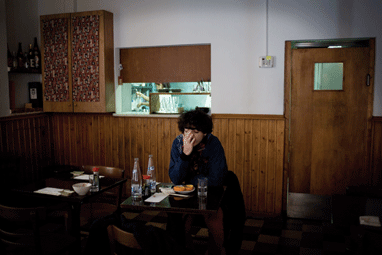Read Jace Clayton's feature story from Issue 54 on Barcelona's resident mindbending tropicalist, El Guincho, whose album Alegranza! gets its official international release this October 7th on Young Turks/XL Recordings .
Story Jace Clayton
Photography Leonie Purchas
Barcelona is not the place to have a real job. Everyday salaries drag behind Euro cost-of-living price hikes. You gotta speak Spanish and Catalan. And if you don’t know the latter, you have to attend classes at a government spot called, no joke, The Center for Linguistic Normalization on a tiny medieval street in the Gothic Quarter, five minutes from the surveillance cameras in Plaza George Orwell. Most of all, you need superhuman focus to avoid the endless, gorgeous distractions of the city’s haute-couture slash beach bum vibe. In other words, it’s an ideal place to be a musician or a student.
A few years ago, 24-year-old Pablo Díaz-Reixa moved there from his native Canary Islands to be both. Taking on the name El Guincho, he got swept up in the city’s indie scene, a loose network of musicians flowing between cafés and rehearsals in the quiet-cool uptown barrio called Gracia. (If you lived in the city, you might remember the Catalan Socialist party anthem on TV a few years back—an internationale with a sneaky reggaeton beat slipped in. He wrote that.) But somewhere in Barcelona’s easy pace, El Guincho lost track of the sun. “I’d leave the studio thinking it was 10 in the morning,” he remembers, “only to find midnight.” Holed up, recording an album on borrowed studio time and a diet of cortados and döner kebab, El Guincho would soon be rejected by every label he shopped his project to. But the Gracia network caught him before he fell too far. A buddy named Félix Ruiz III, a complete newcomer to the music biz, dropped everything when he heard the record, titled Alegranza!. Ruiz poured his life savings into starting a label just to release it.

A friend in the Canaries sent me a ZIP file of the album right after it came out. The Spanglish note said, “Originally from Gran Canaria, pero ahora el vive en Barcelona. Para mi, es similar a Nana Vasconcelos.” Listening to Alegranza! with no more introduction than that, I thought to myself, Not like any Spanish band I’d ever heard. Virtuoso sample chops with live shit on top. Sounds African, or Brazilian. Whoever this is, they’re vibing hard on the tropical.
The same kind of word-of-mouth fascination was popping off all across the Iberian peninsula. With a history of US and UK-influenced rock, eurotechno, flamenco and hair metal, Spain wasn’t ready for anything like El Guincho. Beautiful, clattering dance beats and sun-drenched, sampladelic melodies hugging sing-along vocals hit like a tropical storm. It lacked the Anglo-rock hallmarks Spain’s established indie labels were accustomed to, and they refused to bite. A&Rs may have slept, but the rest of the country did not. National press ate it up and weeks later, Alegranza! was topping Best of 2007 lists and attracting young fans who didn’t love Photoshopped pop. A few clicks over on the social spectrum, clubbers sick of the terrible trance shit called bakalao—literally “codfish”— discovered that they could rave to El Guincho’s ecstatic, beat-heavy live shows. By spring ’08, less than four months after it was released, Alegranza! was snapped up by XL Recordings for its official US and UK release.
“Viral” may explain the buzz abroad, but you need a word like “wildfire” to describe El Guincho’s exploding popularity in Spain. Catch him rocking his home turf today, and you’ll see a thousand kids dancing nonstop. Here, intoxication starts early and goes late, and El Guincho still gets weirded out by playing shows before 1AM in other countries. Wearing snug fire engine red jeans and a T-shirt festooned with palm trees and sailboats, he ascends to the stage and begins drumming a floor tom with one hand and tweaking sampler buttons with the other, a one-man band singing playfully repetitive lyrics into a reverb-drenched mic. Comparisons to the Muppet Animal are apt. The crowd whips itself into a heaving bacchanalian mass, hands in the air along with sweat, pheromones, and—before the loosely-enforced smoking ban—an endless cloud of tobacco spiked with hash that’s either homegrown or imported by speedboats across the eight miles of ocean separating Spain from Africa. An El Guincho performance is both physically demanding and emotionally honest. It is what guilt-free joy can sound like.
In person, El Guincho channels both meanings of the word “duende,” a complex flamenco concept related to what we think of as “soul” but that also means “imp.” Skinny, he has dark almond eyes under a mop of hair and a tropical fashion sense of colorful scarves and all-over prints that works against drizzly Manhattan, where I met him amidst his first US tour. “It’s what I saw when I walked out my door,” he says, explaining how the colors evoke his Cuban-Spanish Canary Island roots. “The Canary Islands are in the middle of the world and the middle of nowhere. They’re right next to the Sahara desert. Below you’ve got Senegal, above you’ve got Morocco. It’s really far down—the islands belong to Spain, but it’s a three and a half hour flight to Barcelona.” If his music casually shrugs off Spain’s longtime musical Anglophilia in exchange for thick harmonies and tribal rhythms, that’s just a reflection of a mindstate he attributes to the Canaries. “You’re down there, so African, talking in Spanish, dressing European, but at the same time your roots are in Latin American music, African music,” he says. “My dad was kind of a hippie, he traveled by boat around the islands, surveying land for environmental protection. When I was little I’d go with him. Once I saw el guincho. It’s a very rare bird, an endangered species there. Most of them live on the Alegranza island. And that image stuck with me. That bird from my childhood, it was like everything from the Canaries that I tossed away, back when I wanted to listen to hip-hop, house, punk rock. And then later realized how valuable it was.”
That alias, El Guincho, and the album title are bizarre words even for native Spanish speakers. You can tell “alegranza” means “happiness,” but the ending sounds clunky, a bit trollish. Zoom out and it all seems part of a bigger project: re-vindicating the deeply uncool tribal dances of the old Canaries by pulling them from folklore into tomorrow. “Antillas,” the second track on Alegranza!, resuscitates a childhood melody that was a mini-hit for El Guincho and his adolescent friends. The album closer, “Polca Mazurca,” is indeed a polka tune. Not surprisingly, he namechecks calypso singers and black African guitar bands as influences, but it was J Dilla’s sampling genius that kick-started the El Guincho project. “I’m flattered when all these journalists compare me to Animal Collective or Cornelius or other great bands, but that’s not me,” he explains. “I wouldn’t have done anything if it weren’t for J Dilla. I heard Donuts, wow! That was when I decided to get a sampler and it all started. I couldn’t pay for an MPC, it was way too expensive! I asked for something cheap and they sold me a Roland SP-404.”

After 15 minutes shooting the shit about Dilla and Guinean label Sylliphone and how focused Dr Dre was when NWA first dropped, I’m outclassed when he starts talking about Frank Sinatra’s use of spring reverb. The conversation drifts from Milton Nascimiento (Zeus in El Guincho’s Pantheon) to calypso king Mighty Sparrow, and he says, “When I started producing, I was obsessed with exotica records.” It’s odd to meet a musician so energetic about other people’s music. Some can’t do it even when you specifically ask them too, but El Guincho’s a guy who big ups Martin Denny’s use of panning right before sharing this thoughts on Trinidadian harmonies, a guy who remembers where the cymbals were placed on that Bowie record.
If his love of music seems deep and uncomplicated, El Guincho’s studio process is a kind of lo-fi baroque. It’s so complex he has to draw a wild flowchart to explain it. First he samples. Everything. This operation started years before Alegranza!, back when he dreamt of studying ethnomusicology. Vinyl, CD, mp3s, nature sounds, city noise—these snippets get bounced to an old four-track or his favorite cassette Walkman. “The quality is crap, but it warms up the sound,” he explains. From there they go into the sampler to be played live, then into six cheap guitar amps arranged in a circle around an omni-directional mic. He tunes the amps, adjusting individual volume and EQ settings until the sound quality in his head enters the room. Then he records himself playing live sampler with a Neuman mic borrowed from a friend up the street. Once those tracks are laid down, El Guincho surrounds his drumset with six mics and records live percussion, playing along to those samples. After this come the vocals, layered lyrics with self-provided backing harmonies and shouts.
Somehow out of this tangle of wires emerges music as open as the skies above the tropical archipelago where he grew up. Which is, literally, the sound of the album. El Guincho spent days field-recording on the Barceloneta seashore, concentrating echoes of home—is that a seagull or electronic wreckage?—into tunes like “Costa Paraiso.” Human drumming meshes with machine-sourced material to create the same funky heart-race rhythm you’d get after running down a sand dune and almost losing your balance. Todo lo major, he sings—all the best. The rhythm hits its stride halfway through and suddenly you’re dancing inside the song, buoyed on his waves. What was once repetitive now feels oceanic. You’re inside, afloat. More words leap out. In translation: In the room in the depth in the room/ Do you know if someone saw her?/ Of all the best, of all the best, of all the best/ Nothing for him. Most El Guincho songs are “me” talking to “you”—vulnerable whispers for a lover whooped up into elliptical pop lyrics. The shadows stick out more on a sunny beach, but even when it’s a poetic sketch of loss, the music communicates palpable optimism. All the best is the clearest line in the song. This phrase repeats the most. Maybe it’s what El Guincho wants you to remember.



